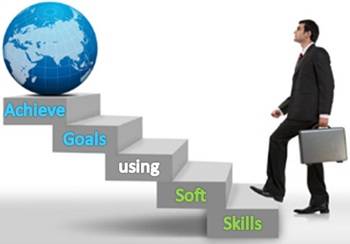Soft skills will help you to achieve your ‘Goal’.

There are hard skills and there are soft skills. Hard skills are specific, can be easily learnt, and include things like being able do something with physical efforts. Hard skills are the minimum skills necessary to do a job. Most people with the same level of education and experience should have roughly the same level of hard skills. But soft skills, are often intangible and, therefore, are not easily taught. They tend to be more of a function of personality characteristics such as motivation, sociability, and work ethic. Some soft skills include leadership, creativity, ambition, accountability, ability to teach, interpersonal abilities, and reliability.
Hard skills make weed out applicants who are obviously not qualified for a job. Beyond this, in the competitive selection process, most employers use soft skills to differentiate one candidate from another. As a result, job seekers can gain a competitive advantage over other candidates by gaining a firm understanding of their own soft skills and then by clearly illustrating those skills to potential employers.
In this article, I will be discussing various skills required for a professional to possess some advantageous assets to make upbeat in the competitive in the professional world. These skills help personnel in various steps in life like social behavior, developing interpersonal relations, strong emotional and professional skills. I am sure if consistent efforts are made to acquire these skills, it will be solving lots of problems in personal, professional life which are faced in everyday’s life.
IDENTIFYING SOFT SKILLS
Soft skills are usually identified in a person by observing personality characteristics and behaviors & attitude. So, most employers will instead look for an indication that an applicant has exhibited certain soft skills in the past. To do this, an interviewer will often ask a candidate situational questions such as, “Tell me about a time when you demonstrated leadership.”
SELLING YOUR SOFT SKILLS
To prepare for an interview, a job seeker should keep in mind that the most important information he or she can convey to the interviewer is soft skills he or she possesses. A job seeker should consider what soft skills would be necessary on the job – even beyond those stated in the job description. Then, think of a way to illustrate each of these skills by means of an anecdote.
For the, “Tell me about a time when you demonstrated leadership,” question, you can narrate any situation where you did something sudden an unexpected apart from your stated responsibilities. Something like: “Last year I was asked to fill in for a charge nurse who was unexpectedly absent. I did so, and we got through the entire shift on our very busy unit without any problems.” Such a statement shows that the job seeker showed leadership skills in the past and indicates that those skills could be called upon, if necessary, in the future.
Remember: Hard skills will get an applicant an interview, but soft skills will get that person a job. Take the time to identify your soft skills and practice ways of selling them in interviews. This will certainly help you stand out as someone with the ability to handle the job description – both hard and soft.

 Currency Convertor
Currency Convertor Post an article
Post an article Abhishek Sharma
Abhishek Sharma
 sending...
sending...




